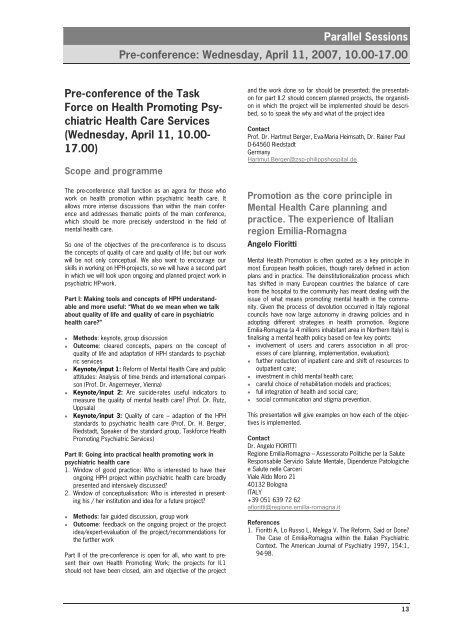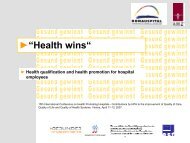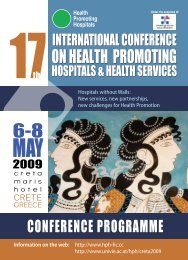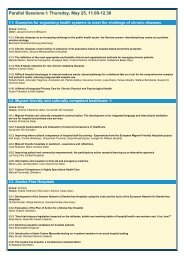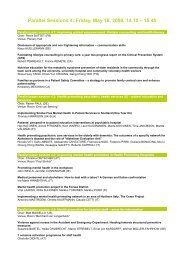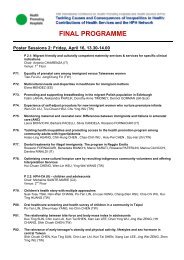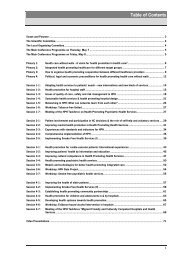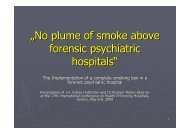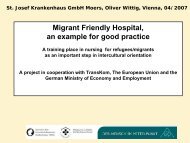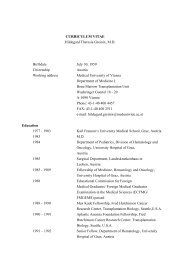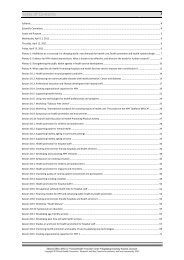Plenary 1: The Hospital – A Staff Empowering ... - HPH-Conference
Plenary 1: The Hospital – A Staff Empowering ... - HPH-Conference
Plenary 1: The Hospital – A Staff Empowering ... - HPH-Conference
Create successful ePaper yourself
Turn your PDF publications into a flip-book with our unique Google optimized e-Paper software.
Parallel Sessions<br />
Pre-conference: Wednesday, April 11, 2007, 10.00-17.00<br />
Pre-conference of the Task<br />
Force on Health Promoting Psychiatric<br />
Health Care Services<br />
(Wednesday, April 11, 10.00-<br />
17.00)<br />
Scope and programme<br />
<strong>The</strong> pre-conference shall function as an agora for those who<br />
work on health promotion within psychiatric health care. It<br />
allows more intense discussions than within the main conference<br />
and addresses thematic points of the main conference,<br />
which should be more precisely understood in the field of<br />
mental health care.<br />
So one of the objectives of the pre-conference is to discuss<br />
the concepts of quality of care and quality of life; but our work<br />
will be not only conceptual. We also want to encourage our<br />
skills in working on <strong>HPH</strong>-projects, so we will have a second part<br />
in which we will look upon ongoing and planned project work in<br />
psychiatric HP-work.<br />
Part I: Making tools and concepts of <strong>HPH</strong> understandable<br />
and more useful: “What do we mean when we talk<br />
about quality of life and quality of care in psychiatric<br />
health care?”<br />
� Methods: keynote, group discussion<br />
� Outcome: cleared concepts, papers on the concept of<br />
quality of life and adaptation of <strong>HPH</strong> standards to psychiatric<br />
services<br />
� Keynote/input 1: Reform of Mental Health Care and public<br />
attitudes: Analysis of time trends and international comparison<br />
(Prof. Dr. Angermeyer, Vienna)<br />
� Keynote/input 2: Are suicide-rates useful indicators to<br />
measure the quality of mental health care? (Prof. Dr. Rutz,<br />
Uppsala)<br />
� Keynote/input 3: Quality of care <strong>–</strong> adaption of the <strong>HPH</strong><br />
standards to psychiatric health care (Prof. Dr. H. Berger,<br />
Riedstadt, Speaker of the standard group, Taskforce Health<br />
Promoting Psychiatric Services)<br />
Part II: Going into practical health promoting work in<br />
psychiatric health care<br />
1. Window of good practice: Who is interested to have their<br />
ongoing <strong>HPH</strong> project within psychiatric health care broadly<br />
presented and intensively discussed?<br />
2. Window of conceptualisation: Who is interested in presenting<br />
his / her institution and idea for a future project?<br />
� Methods: fair guided discussion, group work<br />
� Outcome: feedback on the ongoing project or the project<br />
idea/expert-evaluation of the project/recommendations for<br />
the further work<br />
Part II of the pre-conference is open for all, who want to present<br />
their own Health Promoting Work; the projects for II.1<br />
should not have been closed, aim and objective of the project<br />
and the work done so far should be presented; the presentation<br />
for part II.2 should concern planned projects, the organistion<br />
in which the project will be implemented should be described,<br />
so to speak the why and what of the project idea<br />
Contact<br />
Prof. Dr. Hartmut Berger, Eva-Maria Heimsath, Dr. Rainer Paul<br />
D-64560 Riedstadt<br />
Germany<br />
Hartmut.Berger@zsp-philippshospital.de<br />
Promotion as the core principle in<br />
Mental Health Care planning and<br />
practice. <strong>The</strong> experience of Italian<br />
region Emilia-Romagna<br />
Angelo Fioritti<br />
Mental Health Promotion is often quoted as a key principle in<br />
most European health policies, though rarely defined in action<br />
plans and in practice. <strong>The</strong> deinstitutionalization process which<br />
has shifted in many European countries the balance of care<br />
from the hospital to the community has meant dealing with the<br />
issue of what means promoting mental health in the community.<br />
Given the process of devolution occurred in Italy regional<br />
councils have now large autonomy in drawing policies and in<br />
adopting different strategies in health promotion. Regione<br />
Emilia-Romagna (a 4 millions inhabitant area in Northern Italy) is<br />
finalising a mental health policy based on few key points:<br />
� involvement of users and carers association in all processes<br />
of care (planning, implementation, evaluation);<br />
� further reduction of inpatient care and shift of resources to<br />
outpatient care;<br />
� investment in child mental health care;<br />
� careful choice of rehabilitation models and practices;<br />
� full integration of health and social care;<br />
� social communication and stigma prevention.<br />
This presentation will give examples on how each of the objectives<br />
is implemented.<br />
Contact<br />
Dr. Angelo FIORITTI<br />
Regione Emilia-Romagna <strong>–</strong> Assessorato Politiche per la Salute<br />
Responsabile Servizio Salute Mentale, Dipendenze Patologiche<br />
e Salute nelle Carceri<br />
Viale Aldo Moro 21<br />
40132 Bologna<br />
ITALY<br />
+39 051 639 72 62<br />
afioritti@regione.emilia-romagna.it<br />
References<br />
1. Fioritti A, Lo Russo L, Melega V. <strong>The</strong> Reform, Said or Done?<br />
<strong>The</strong> Case of Emilia-Romagna within the Italian Psychiatric<br />
Context. <strong>The</strong> American Journal of Psychiatry 1997, 154:1,<br />
94-98.<br />
13


